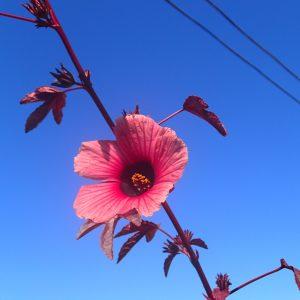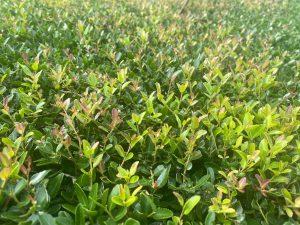Southerners and sweet tea
When I was a child we drank sweet tea. I didn’t really know where it came from but it was sweet and that suited me just fine. Later, I discovered tea was from the leaf of a plant. I had heard about tea leaves and it still didn’t resonate much. I only knew it wasn’t grown anywhere near where I lived in Florida. Later, and by the time I obtained a degree in Horticulture, I had learned that the kind of tea that I grew up drinking was from a camelia plant (Camellia sinensis) and was mostly grown in Asia. I had grown Camellia japonica, which was an ornamental flowering shrub, and I was curious why most teas came from China. It wasn’t weighing heavy on my mind though, and a few years ago, during a visit to the Epcot flower show, I observed tea plants, Camellia sinensis, being grown there in a display. Apparently, traditional tea plants can be grown in Florida.

Growing it yourself
Black and green tea grown from Camillia sinensis is a billion-dollar annual business across the world. Scientists at the University of Florida are growing these teas in Florida and finding that they grow well here. Early findings show the quality of Florida-grown teas can be as good as the tea that grows in Asia. If you’re like me, you find it interesting to know that traditional tea could be grown in your own Florida garden. Your Florida garden can grow many other plants that can produce tea-like drinks too. Many types of plants can be used to make these less traditional teas. A caffeinated drink is being marketed that comes from the leaves of the native yaupon holly tree. Roselle, related to Hibiscus, is used in drinks by boiling the calyx which is the part of the flower that remains after the flower falls off. False roselle, pictured to the right, can also be used in teas or eaten as a leafy vegetable.
Making healthy choices
Plant-based drinks from a variety of teas can be very healthy with some claiming calming or anti-inflammatory properties. Whether these types of claims can be scientifically substantiated might yet be decided, but one thing we do know is that plants harbor many nutrients that can improve our

health. Also, phytonutrients in these teas will be fresher when you grow and prepare them yourself.
Learn from the Experts at UF/IFAS
On June 11th UF/IFAS Extension is offering a class on Garden Teas and Herbal Drinks. Master Gardener Volunteer Rob Maulella and guest instructor Sandra Foster will share their knowledge on the subject. Y0u will be surprised at the variety of plants that can be infused into drinks and you will have an opportunity to sample teas and take home recipes. You’ll be anxious to start your tea Garden right away! To register, click here! The cost of the class is $12.50 online and $15 at the door. Sign-up early so there will be enough samples to go around!
That’s what’s new from the Hometown Gardener. Like and Follow me on Facebook at Hometown Gardener.
Read my other blogs by clicking here.
Sign up for our Highlands County Master Gardener Volunteer, “Putting Down Root” Newsletter Here.
Join our Facebook groups Highlands County Master Gardeners, Science-Based Florida Gardening Answers, Central Florida Butterfly and Pollinator Club, and Heartland Beekeepers
In Highlands County, the UF/IFAS Extension office is at 4509 W George Blvd., Sebring. The Master Gardener Help Desk is open Monday – Friday from 9 AM to 3:30 PM.
Posted: May 27, 2022
Source: UF/IFAS Alert – https://blogs.ifas.ufl.edu/



